最新人教版九年级英语第九单元知识点(1)
人教版九年级英语unit 9单元知识点

人教版九年级英语unit 9单元知识点Unit 9 Knowledge Points in Grade 9 EnglishIntroduction:In the ninth grade English curriculum, Unit 9 covers important topics related to transportation and travel. This unit equips students with useful vocabulary, sentence structures, and grammar concepts to communicate effectively in various travel scenarios. Let's delve into some key knowledge points from Unit 9.1. Vocabulary:Expanding one's vocabulary is crucial for effective communication. Unit 9 introduces a range of travel-related words and phrases such as "commute," "boarding pass," and "lost luggage." Additionally, it emphasizes adjectives to describe transportation, such as "convenient," "comfortable," and "reliable." Learning these words will enhance students' ability to talk about different modes of transportation and travel experiences.2. Sentence Patterns:Unit 9 focuses on sentence patterns commonly used in travel situations. For instance, students learn to express the purpose of theirtravel using the sentence structure "I'm going to + place + to + verb." They also practice asking and giving directions using the "Can you tell me how to + verb" or "Go down + street name + and turn + direction" patterns. Mastering these patterns helps students engage confidently in conversations related to travel.3. Grammar Concepts:Unit 9 introduces two important grammar concepts: the future continuous tense and the passive voice. The future continuous tense is used to describe an ongoing action that will happen in the future. For example, "Next month, I will be traveling to Europe." Students also learn how to form passive sentences, which are useful when discussing transportation services, such as "Buses are often used for public transportation." Understanding and practicing these grammar concepts enhances students' ability to express themselves accurately and appropriately.4. Listening Skills:Listening comprehension is vital for effective communication. Unit 9 provides students with listening exercises that focus on travel-related conversations, such as buying tickets or asking for travel advice. By practicing listening skills, students not only improve their ability tounderstand spoken English but also learn essential travel-related phrases and expressions.5. Speaking Activities:Unit 9 encourages students to engage in various speaking activities to build confidence in expressing themselves orally. For instance, they can participate in role-plays simulating different travel scenarios like checking into a hotel or buying train tickets. These activities enhance communicative competence and help students apply the vocabulary, sentence patterns, and grammar concepts they have learned.6. Reading Comprehension:Unit 9 includes reading passages that provide students with exposure to different types of travel-related texts. These passages range from advertisements for travel agencies to travel blogs describing personal experiences. Reading comprehension activities enable students to improve their reading skills while gaining knowledge about travel destinations and cultural aspects.Conclusion:Unit 9 in the Grade 9 English curriculum offers essential knowledge points to enhance students' understanding and proficiency in travel-related English communication. From expanding vocabulary to mastering grammar concepts and engaging in various activities, students develop the necessary skills to navigate travel situations confidently. By incorporating listening, speaking, and reading comprehension exercises, this unit ensures a comprehensive approach to language acquisition. Through effective learning strategies and practice, students can embark on their own English language journey, exploring the world one conversation at a time.。
人教版英语九年级unit9知识点

人教版英语九年级unit9知识点Unit 9: Celebrating Culture - Exploring Diverse TraditionsIntroduction:In this article, we will delve into the knowledge points of Unit 9 of the 9th grade English textbook prescribed by the Ministry of Education in China. Unit 9 focuses on celebrating culture and explores diverse traditions that exist around the world. It is crucial to understand and appreciate different cultures as it promotes empathy, tolerance, and acceptance of diversity.1. Traditional Festivals:Traditional festivals are an important part of cultural heritage, allowing individuals and communities to connect with their roots and understand their history. The unit introduces us to various traditional festivals celebrated worldwide, such as Diwali, Thanksgiving, Christmas, etc. Exploring these festivals helps us gain insights into the unique customs, rituals, and significance behind them.2. Festive Foods:Food plays a significant role in traditional festivals. It not only nourishes the body but also symbolizes cultural values and traditions.The unit highlights some traditional festive foods, like mooncakes, turkey, and kolach, revealing the cultural significance attached to these delicacies. Understanding the historical and cultural context behind festive foods expands our knowledge of different cultures.3. Customs and Symbols:Every culture has its own customs and symbols that hold special meaning. Unit 9 provides examples of customs and symbols associated with different festivals or celebrations. For instance, the unit mentions the practice of decorating Christmas trees, the use of lanterns during Chinese New Year, and the significance of rangolis during Diwali. Exploring these customs and symbols nurtures an appreciation for cultural diversity and fosters intercultural understanding.4. Traditional Costumes:Traditional costumes are an essential aspect of a culture's identity. Unit 9 introduces us to various traditional costumes worn during festivals or special occasions. Each costume reflects not only the fashion trends of that era but also conveys cultural values, history, and aesthetics. For example, the hanbok in South Korea and the kimono in Japan symbolize their respective cultures, while the qipao represents Chinese culture. Learning about traditional costumes enhances our understanding and respect for cultural differences.5. Festive Music and Dance:Music and dance are universal languages that transcend cultural boundaries. Unit 9 provides insights into the music and dance forms associated with various celebrations. For instance, the unit explores Indian classical dance forms like Bharatanatyam and Kathak, as well as Western dances like the waltz and salsa. Discovering the rhythms and melodies of different cultures broadens our horizons and helps us appreciate the rich artistic heritage worldwide.6. Art and Crafts:Art and craft forms have been passed down through generations, preserving cultural traditions. The unit discusses the art and craft forms associated with festivals, such as Chinese paper cutting, Mexicanpiñatas, and Indian Rangoli. Exploring these artistic expressions fosters creativity and an understanding of the beauty and diversity in global art practices.Conclusion:Unit 9 of the 9th grade English textbook takes us on a journey through diverse cultural traditions. By studying traditional festivals, festive foods, customs, symbols, costumes, music, dance, art, and crafts, we gain a deep appreciation for the rich tapestry of global cultures.Understanding and celebrating cultural diversity is crucial in building a harmonious and inclusive society. Let us embrace our differences and promote intercultural understanding for a better future.。
人教版九年级英语unit9知识点
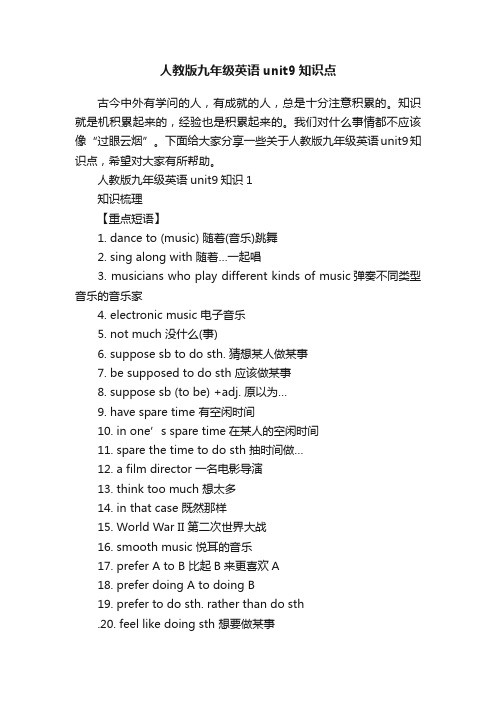
人教版九年级英语unit9知识点古今中外有学问的人,有成就的人,总是十分注意积累的。
知识就是机积累起来的,经验也是积累起来的。
我们对什么事情都不应该像“过眼云烟”。
下面给大家分享一些关于人教版九年级英语unit9知识点,希望对大家有所帮助。
人教版九年级英语unit9知识1知识梳理【重点短语】1. dance to (music) 随着(音乐)跳舞2. sing along with 随着…一起唱3. musicians who play different kinds of music弹奏不同类型音乐的音乐家4. electronic music 电子音乐5. not much 没什么(事)6. suppose sb to do sth. 猜想某人做某事7. be supposed to do sth 应该做某事8. suppose sb (to be) +adj. 原以为…9. have spare time 有空闲时间10. i n one’s spare time在某人的空闲时间11. spare the time to do sth 抽时间做…12. a film director 一名电影导演13. think too much 想太多14. in that case 既然那样15. World War II 第二次世界大战16. smooth music 悦耳的音乐17. prefer A to B 比起B来更喜欢A18. prefer doing A to doing B19. prefer to do sth. rather than do sth.20. feel like doing sth 想要做某事21. stick to 坚持,固守22. be down 悲哀,沮丧23. cheer sb up 使… 高兴/ 振奋24. have a happy ending 有个美满的结局25. try one’s best to do sth. 尽某人最大努力做…26. less serious 不那么严重27. a good way to do sth 做某事的好办法28. make me feel even sadder 让我感觉更伤心29. provide plenty of information about a certain subject提供了大量的关于某个主题的信息30. shut off my brain 关闭我的大脑【重点句型】1. I love singers who write their own music.我喜欢自己创作曲子的歌手。
人教版初中英语九年级u9知识点
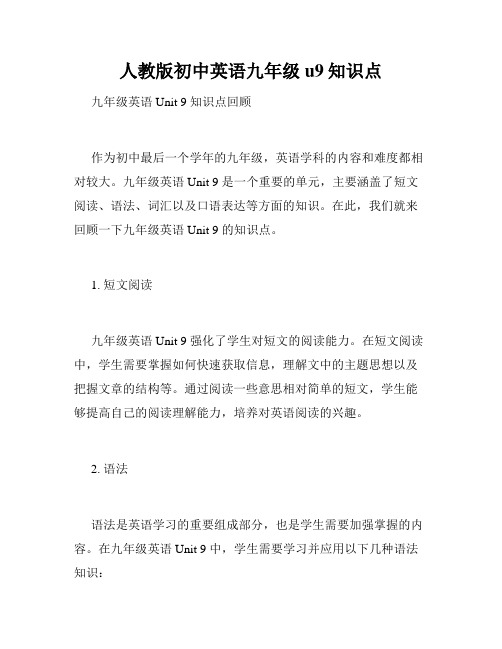
人教版初中英语九年级u9知识点九年级英语 Unit 9 知识点回顾作为初中最后一个学年的九年级,英语学科的内容和难度都相对较大。
九年级英语 Unit 9 是一个重要的单元,主要涵盖了短文阅读、语法、词汇以及口语表达等方面的知识。
在此,我们就来回顾一下九年级英语 Unit 9 的知识点。
1. 短文阅读九年级英语 Unit 9 强化了学生对短文的阅读能力。
在短文阅读中,学生需要掌握如何快速获取信息,理解文中的主题思想以及把握文章的结构等。
通过阅读一些意思相对简单的短文,学生能够提高自己的阅读理解能力,培养对英语阅读的兴趣。
2. 语法语法是英语学习的重要组成部分,也是学生需要加强掌握的内容。
在九年级英语 Unit 9 中,学生需要学习并应用以下几种语法知识:2.1. 定语从句定语从句是一种描述名词或代词的从句,用来修饰或限定名词或代词的意义。
通过学习定语从句,学生可以更准确地描述和表达人或物的特征,从而让自己的英语表达更加精彩。
2.2. 状语从句状语从句是一种修饰主句的从句,它可以表示时间、原因、目的、条件、方式等。
学生需要学会运用不同的状语从句来丰富自己的句子,让表达更具逻辑性和准确性。
2.3. 虚拟语气虚拟语气是英语中一种表达假设、愿望、建议等非真实情况的语气。
通过学习虚拟语气,学生可以提高自己的语言表达能力,让自己的意思更加明确和有说服力。
3. 词汇词汇是语言的基础,也是学生英语学习中的重点。
在九年级英语 Unit 9 中,学生需要巩固和扩展一些与话题相关的词汇,如环境、污染、保护等。
通过积累和运用这些词汇,学生可以更好地理解和表达与环境保护相关的概念和观点。
4. 口语表达口语表达是英语学习中的一项重要技能,也是与他人进行交流的主要方式。
在九年级英语 Unit 9 中,学生需要通过一些话题讨论和角色扮演等活动来提高自己的口语表达能力。
通过与同学们的互动和交流,学生可以更流利地表达自己的意见和观点。
人教版九年级全册英语第9单元知识点复习提纲

人教版九年级全册英语第9单元知识点复习提纲1.课文原句:Oh, in that case, I'll ask someone who likes serious movies.in that case固定短语,意为“既然那样;如果那样的话;在那种情况下”。
辨析:2.课文原句:I prefer movies that give me something to think about.prefer 动词,意为“更喜欢,宁愿”。
prefer (doing) A to (doing) B“相比(做)B,更喜欢(做)A”例:I prefer listening to music to watching TV.prefer to do A rather than do B “和做B相比,更喜欢做A”例:I prefer to listen to music rather than watch TV.prefer+that从句,“更喜欢……”。
例:We prefer that the plan shall be fully discussed.3.课文原句:Documentaries like March of the Penguins which provide plenty of information about a certain subject can be interesting, but when I'm tired I don't want to think too much. plenty of丰富;充足;大量。
后面接可数名词和不可数名词均可,其作主语时,接可数名词时谓语用复数,接不可数名词时,谓语用单数。
例:He has plenty of humorous stories to tell.She has plenty of stamps.There is plenty of space to store your things.There are plenty of apples in the box.辨析:(1) 表示“多”的意思,可用many,much,a lot of,lots of,plenty of,a good/great many,a large amount of等。
九年级全一册9单元知识点

九年级全一册9单元知识点
九年级全一册的第9单元知识点主要包括以下内容:人教版九
年级英语全一册涵盖文法知识点、词汇积累以及阅读技巧等方面。
一、文法知识点
1. 一般现在时和一般过去时:使用规则、否定句和疑问句的构
成等;
2. 现在进行时:构成以及表示目前正在发生的动作或状态;
3. 一般将来时:表示将来发生的动作或存在的状态;
4. 过去进行时:表示过去某一时刻正在进行的动作;
5. 过去完成时:表示过去某一时刻之前已经完成的动作;
6. 语态变化:主动语态和被动语态的构成及使用;
7. 宾语从句:引导词、语序和时态等。
二、词汇积累
1. 同义词、反义词、词组和固定搭配的使用;
2. 词性转换:名词、动词、形容词和副词之间的相互转换;
3. 词汇拓展:通过前缀、后缀和派生词等方式扩展词汇量;
4. 近义词辨析:根据上下文选择合适的词语。
三、阅读技巧
1. 找出关键词:通过查找文中的关键词,帮助理解文章的主题
和内容;
2. 推测词义:通过上下文的提示猜测生词的意思;
3. 分段阅读:将长篇文章分成段落,逐段理解文章的内涵;
4. 主旨概括:通过阅读理解整篇文章的主要内容;
5. 推理判断:根据文章的细节进行推理和判断。
以上是九年级全一册9单元的主要知识点,通过学习这些知识,能够提高英语语法和词汇的应用能力,提升阅读理解和分析能力。
在学习过程中,要注重练习和巩固,通过多做习题和阅读练习,
掌握这些知识点,并运用到实际的写作和口语交流中。
祝你学业
进步!。
人教英语九年级unit9知识点

人教英语九年级unit9知识点Unit 9: Putting the World to RightsIntroduction:Being able to effectively express our opinions and engage in meaningful discussions is a crucial skill that helps us navigate the world and contribute to positive change. In Unit 9 of the 9th-grade English curriculum by People's Education Press (人教版), students explore various topics related to social issues and learn how to express their perspectives in a respectful and persuasive manner. Let's delve into the knowledge points covered in this unit and understand the importance of discussing global problems.1. Vocabulary Expansion:Unit 9 introduces students to a wide range of vocabulary related to social problems, such as pollution, poverty, discrimination, etc. By mastering these words and understanding their meanings, students can effectively communicate their thoughts on such issues. Moreover, the acquisition of this vocabulary allows students to comprehend articles and discussions related to global problems, broadening their worldview.2. Grammar Usage:In this unit, students encounter grammar structures such as conditionals and reported speech. These grammatical tools are essential for expressing opinions and discussing hypothetical situations. When students learn how to use conditionals effectively, they can debate possible solutions to global challenges. Reported speech, on the other hand, enables them to accurately convey the viewpoints of experts and individuals involved in addressing social issues.3. Reading Comprehension:Unit 9 includes a variety of reading materials, from informative articles to opinion pieces. These texts expose students to diverse perspectives and enable them to think critically about global problems. Through guided discussions and activities, students learn not only to comprehend the main ideas in the texts but also to analyze the author's tone and purpose. This skill helps them become well-informed individuals capable of engaging in thoughtful conversations.4. Public Speaking and Presentation Skills:One of the key objectives of Unit 9 is to develop students' public speaking and presentation skills. Students are encouraged to express their opinions in front of their peers, fostering confidence and the ability to articulate their thoughts effectively. By researching and presenting on topics related to social issues, students improve their research skills and learn how to present complex ideas in a clear and concise manner.5. Empathy and Understanding:Unit 9 emphasizes the development of empathy and understanding towards individuals who face social problems. By engaging in activities that promote empathy, such as role-playing and group discussions, students are encouraged to put themselves in the shoes of others. This cultivates compassion and a sense of responsibility, driving them to take action and contribute to making the world a better place.Conclusion:Unit 9 of People's Education Press' 9th-grade English curriculum offers students a comprehensive understanding of social issues and equips them with the necessary skills to express opinions and engage in discussions. By tackling important global problems, students not onlybecome better communicators but also develop empathy and a sense of social responsibility. Through this unit, students are encouraged to think critically, analyze different perspectives, and actively participate in making positive changes in the world.。
人教班九年级unit9知识点
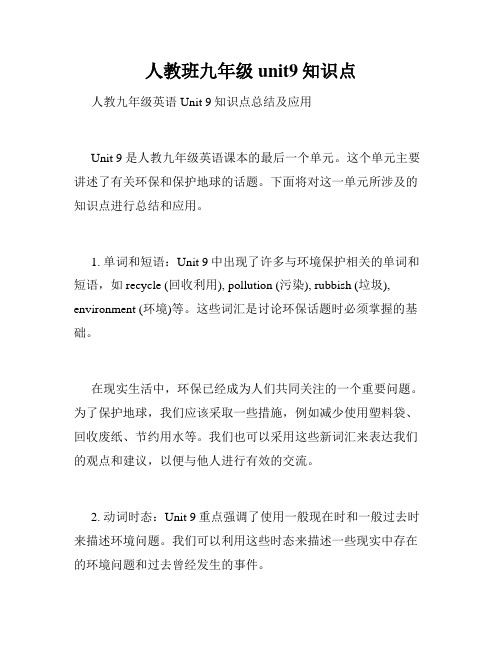
人教班九年级unit9知识点人教九年级英语Unit 9知识点总结及应用Unit 9 是人教九年级英语课本的最后一个单元。
这个单元主要讲述了有关环保和保护地球的话题。
下面将对这一单元所涉及的知识点进行总结和应用。
1. 单词和短语:Unit 9中出现了许多与环境保护相关的单词和短语,如recycle (回收利用), pollution (污染), rubbish (垃圾), environment (环境)等。
这些词汇是讨论环保话题时必须掌握的基础。
在现实生活中,环保已经成为人们共同关注的一个重要问题。
为了保护地球,我们应该采取一些措施,例如减少使用塑料袋、回收废纸、节约用水等。
我们也可以采用这些新词汇来表达我们的观点和建议,以便与他人进行有效的交流。
2. 动词时态:Unit 9重点强调了使用一般现在时和一般过去时来描述环境问题。
我们可以利用这些时态来描述一些现实中存在的环境问题和过去曾经发生的事件。
例如,我们可以说:"People throw rubbish everywhere, which pollutes the environment." (人们到处乱扔垃圾,这污染了环境。
) 或"Last year, there was a big fire in the forest near my hometown." (去年,在我家乡附近的森林里发生了一场大火。
)这些时态的正确使用可以让我们更加生动地描述环境问题,有效地与他人交流。
3. 句子结构:在Unit 9中,出现了一些复杂的句子结构,如宾语从句,定语从句和条件句等。
这些结构的使用可以让我们的句子更加丰富多样。
例如,我们可以说:"I believe that if everyone recycles, we can make the world a better place." (我相信,如果每个人都回收利用,我们可以使世界变得更美好。
2023年人教版九年级英语第九单元知识点总结

人教版九年级英语第九单元知识点总结Unit 9 I like music that I can dance to.单词Prefer lyrics Australia electronic suppose smooth spare director case in that case war stick Stick to shut shut off down dialog ending documentary dram plenty of superhero sadness pain moving lifetime pity total in total master recall wound painful once in a while intelligent sense. reflect .perform praise一.1. dance to music 伴随音乐起舞 2. sing along with 伴随……一起唱 3. musicians who play different kinds of music 弹奏不一样类型音乐旳音乐家 4. electronic music 电子音乐5. not much=nothing much 没什么(事)6. suppose sb. to do sth. 猜测某人做某事be supposed to do sth. 应当做某事suppose sb (to be) +adj. 原认为某人是……7. have spare time 有空闲时间in one's spare time 在某人旳空闲时间spare the time to do sth. 抽时间做……8. think too much 想得太多;过度思索9 in that case 既然那样10. World War II 第二次世界大战11. smooth music 悦耳旳音乐12. prefer A to B 比起B来更喜欢A prefer doing A to doing B 乐意去做A而不是去做B prefer to do A rather than do B 宁愿做A而不做B 13. feel like doing sth. 想要做某事=want to do sth. =would like to do sth. 14. stick to 坚持,固守15. be down 悲伤,沮丧16. cheer sb up 使…快乐/ 振奋17. have a happy ending 有个美满旳结局18. less serious 不那么严重19. a good way to do sth. 做某事旳好措施20. shut off 关闭21. in time 及时on time 准时/准时22. once in a while 偶尔旳;有时=sometimes /at times 23. write one's own lyrics 自己写歌词24. take sb to sp. 带某人去某地25. Chinese folk music 中国民间音乐26. be played on the erhu 由二胡演奏旳27. move sb. 感动某人(sb. be moved by sth.)28.strangely beautiful 异常旳/出奇旳美29. sense a strong sadness and pain 感觉到一种强烈旳伤感和痛苦30. the most moving pieces of music 最令人感动旳乐曲31. the city of Shantou = Shantou city 汕头市32. by age 17 到十七岁旳时候33. musical ability 音乐才能34. develop a serious illness 得了一种很重旳病35. become blind 成了盲人;变瞎36. make money 盈利37. get married (to sb.) (和某人)结婚38. continue to do sth. 继续去做某事(另一件事)continue doing sth. 继续做着某事(同一件事)39. perform in this way 用这种形式演出40. during/ in one's lifetime 在某人有生之年41. by the end of ... 到……末为止(时间)at the end of ... 在……尽头/末梢(时间、地点)42. It's a pity that ... 遗憾旳是……43. in total 总共44. be recorded for the future world to hear 被记录下来供后人聆听45. praise ... for ... 由于……赞美46. China's national treasures 中国旳国家珍宝47. paint a picture of ... 描绘了一幅……画48. recall one's deepest wounds 唤起某人最深旳伤痛49. painful experiences 痛苦旳经历50. a time for spreading joy 传播快乐旳时间51. live a very hard life.过着艰苦旳生活。
新人教版九年级英语unit9重点知识点
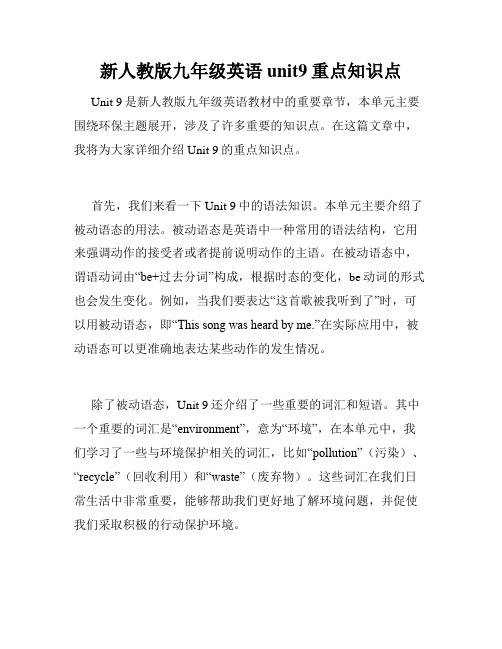
新人教版九年级英语unit9重点知识点Unit 9是新人教版九年级英语教材中的重要章节,本单元主要围绕环保主题展开,涉及了许多重要的知识点。
在这篇文章中,我将为大家详细介绍Unit 9的重点知识点。
首先,我们来看一下Unit 9中的语法知识。
本单元主要介绍了被动语态的用法。
被动语态是英语中一种常用的语法结构,它用来强调动作的接受者或者提前说明动作的主语。
在被动语态中,谓语动词由“be+过去分词”构成,根据时态的变化,be动词的形式也会发生变化。
例如,当我们要表达“这首歌被我听到了”时,可以用被动语态,即“This song was heard by me.”在实际应用中,被动语态可以更准确地表达某些动作的发生情况。
除了被动语态,Unit 9还介绍了一些重要的词汇和短语。
其中一个重要的词汇是“environment”,意为“环境”,在本单元中,我们学习了一些与环境保护相关的词汇,比如“pollution”(污染)、“recycle”(回收利用)和“waste”(废弃物)。
这些词汇在我们日常生活中非常重要,能够帮助我们更好地了解环境问题,并促使我们采取积极的行动保护环境。
另外一个重要的短语是“take action”,意为“采取行动”。
在本单元中,我们学习了“take action to do sth.”的用法,表示采取具体的行动来解决问题。
例如,我们可以说“we should take action to reduce po llution”(我们应该采取行动来减少污染)。
这个短语的使用可以帮助我们在写作和口语表达中更具有说服力。
除了语法和词汇,Unit 9还介绍了一些重要的口语表达和交际用语。
例如,当我们询问别人是否关心环境问题时,可以使用句型“What do you think of...?”或者“What's your opinion on...?”。
当然,我们还可以用其他的方式表达相同的意思,这需要根据具体情况和语境进行灵活运用。
九年级上册英语人教版u9知识点

九年级上册英语人教版u9知识点九年级上册英语人教版Unit 9知识点在九年级的英语学习中,Unit 9 是一个重要的单元。
这个单元主要涵盖了“understanding people”的主题,旨在帮助学生更好地了解人们的行为和性格特点。
本文将对Unit 9的知识点进行介绍和解读。
一、词汇与短语1. character (n.) - 代表人物的性格或特点。
例如:She has a very strong character.2. behavior (n.) - 指人们的举止或行为方式。
例如:His behavior at the party was unacceptable.3. introverted (adj.) - 性格内向的。
例如:She is quite introverted and prefers to spend time alone.4. extroverted (adj.) - 性格外向的。
例如:He is an extroverted person and enjoys being around people.5. confident (adj.) - 自信的,有信心的。
例如:She is confident in her ability to succeed.6. sensitive (adj.) - 敏感的。
例如:He is very sensitive to other people's feelings and emotions.7. creative (adj.) - 创造性的。
例如:She has a very creative mind and loves to think outside the box.8. reliable (adj.) - 可靠的,可信赖的。
例如:He is a reliable friend who always keeps his promises.9. selfish (adj.) - 自私的。
人教版九年级英语unit9知识点归纳

人教版九年级英语unit9知识点归纳Unit 9, as part of the curriculum for ninth grade students learning English, covers a range of topics and knowledge points. In this article, we will summarize the key points from this unit, providing a comprehensive guide for students to review and understand.1. Vocabulary在本单元的词汇部分,我们学习了许多与环境和自然资源相关的词汇。
我们学到了一些问题的解决方式,比如“recycle”(回收利用)和“reuse”(再利用)。
我们还学习了一些有关能源的词汇,如“renewable”(可再生的)和“non-renewable”(不可再生的)。
通过掌握这些词汇,我们能够更好地理解和讨论环境问题。
2. Grammar在本单元的语法部分,我们主要学习了宾语从句和主语从句。
宾语从句是一个从句,作为主句的宾语出现。
主语从句则是作为主句的主语出现。
通过掌握这两种从句的用法,我们可以更准确地表达自己的意思,并且能够更深入地理解和分析句子结构。
3. Reading Skills在阅读技巧方面,本单元重点讨论了如何提高阅读理解能力。
其中包括提前预测、寻找关键词和词组、注意过渡词、理解上下文等技巧。
这些技巧可以帮助我们更好地理解和分析文章,把握文章的主旨和细节。
4. Writing Skills在写作技巧方面,本单元教授了如何写一篇关于环境问题的文章。
我们学习了如何使用合适的词汇和句型来描述问题和提出解决方案。
我们还学习了如何组织文章结构和段落,使文章有逻辑性和连贯性。
5. Speaking and Listening在口语和听力方面,本单元的重点是环保问题和自然灾害。
人教版九年级英语第九单元知识点总结

人教版九年级英语第九单元知识点总结Unit 9 I like music that I can dance to.单词Prefer lyrics Australia electronic suppose smooth spare director case in that case war stick Stick to shut shut off down dialog ending documentary dram plenty of superhero sadness pain moving lifetime pity total in total master recall wound painful once in a while intelligent sense. reflect .perform praise一.1. dance to music 随着音乐起舞 2. sing along with 随着……一起唱 3. musicians who play different kinds of music 弹奏不同类型音乐的音乐家 4. electronic music 电子音乐5. not much=nothing much 没什么(事) 6. suppose sb. to do sth. 猜想某人做某事be supposed to do sth. 应该做某事suppose sb (to be) +adj. 原以为某人是……7. have spare time 有空闲时间in one's spare time 在某人的空闲时间spare the time to do sth. 抽时间做……8. think too much 想得太多;过度思考9 in that case 既然那样10. World War II 第二次世界大战11. smooth music 悦耳的音乐12. prefer A to B 比起B来更喜欢A prefer doing A to doing B 愿意去做A而不是去做 B prefer to do A rather than do B 宁愿做A而不做 B 13. feel like doing sth. 想要做某事=want to do sth. =would like to do sth. 14. stick to 坚持,固守15. be down 悲哀,沮丧16. cheer sb up 使…高兴/ 振奋17. have a happy ending 有个美满的结局18. less serious 不那么严重19. a good way to do sth. 做某事的好办法20. shut off 关闭21. in time 及时on time 按时/准时22. once in a while 偶尔的;有时=sometimes /at times 23. write one's own lyrics 自己写歌词24. take sb to sp. 带某人去某地25. Chinese folk music 中国民间音乐26. be played on the erhu 由二胡演奏的27. move sb. 感动某人(sb. be moved by sth.)28.strangely beautiful 异常的/出奇的美29. sense a strong sadness and pain 感觉到一种强烈的伤感和痛苦30. the most moving pieces of music 最令人感动的乐曲31. the city of Shantou = Shantou city 汕头市32. by age 17 到十七岁的时候33. musical ability 音乐才能34. develop a serious illness 得了一种很重的病35. become blind 成了盲人;变瞎36. make money 赚钱37. get married (to sb.) (和某人)结婚38. continue to do sth. 继续去做某事(另一件事)continue doing sth. 继续做着某事(同一件事)39. perform in this way 用这种形式表演40. during/ in one's lifetime 在某人有生之年41. by the end of ... 到……末为止(时间)at the end of ... 在……尽头/末梢(时间、地点)42. It's a pity that ... 遗憾的是……43. in total 总共44. be recorded for the future world to hear 被记录下来供后人聆听45. praise ... for ... 因为……赞美46. China's national treasures 中国的国家珍宝47. paint a picture of ... 描绘了一幅……画48. recall one's deepest wounds 唤起某人最深的伤痛49. painful experiences 痛苦的经历50. a time for spreading joy 传播快乐的时间51. live a very hard life.过着艰苦的生活。
人教新目标九年级unit9知识点
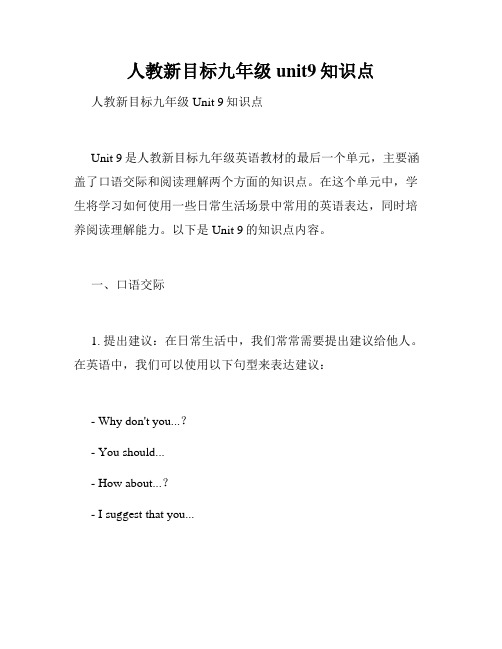
人教新目标九年级unit9知识点人教新目标九年级Unit 9知识点Unit 9是人教新目标九年级英语教材的最后一个单元,主要涵盖了口语交际和阅读理解两个方面的知识点。
在这个单元中,学生将学习如何使用一些日常生活场景中常用的英语表达,同时培养阅读理解能力。
以下是Unit 9的知识点内容。
一、口语交际1. 提出建议:在日常生活中,我们常常需要提出建议给他人。
在英语中,我们可以使用以下句型来表达建议:- Why don't you...?- You should...- How about...?- I suggest that you...2. 表达兴趣和不感兴趣:当我们想表达对某件事情的兴趣或者不感兴趣时,我们可以使用以下句型:- I'm interested in...- I can't stand...- I'm not really into...- I'm crazy about...3. 表达喜好和厌恶:当我们想表达自己对某种事物的喜好或者厌恶时,我们可以使用以下句型:- I like...- I love...- I enjoy...- I hate...- I can't stand...二、阅读理解1. 根据上下文推测词义:在阅读理解中,我们有时候会遇到一些生词,但是可以通过上下文的提示来推测出它们的意思。
我们可以根据上下文词语的功能、词义的关系以及实际情境来进行推测。
2. 根据文章内容回答问题:在阅读理解中,文章通常会围绕一个主题展开介绍。
我们可以通过仔细阅读文章内容,理解主旨和细节信息,从而回答相关问题。
3. 利用标题和图片预测文章内容:阅读理解中的标题和图片通常会提供一些线索来预测文章的内容。
在阅读前,我们可以先读标题和观察图片,猜测文章的主题和大致内容,有助于我们更好地理解整篇文章。
通过掌握上述口语交际和阅读理解的知识点,我们可以更加流利地进行日常生活中的英语交流,并且能够更好地理解和解读各类英语文章。
人教版九年级英语Unit9知识点梳理及语法讲义(学生版)

九年级英语Unit 9知识点与语法精讲精练词汇梳理(一)完成单词梳理:名词:1. 歌词 2. 导演;部门 3. 战争;战争状态4. 情况;实情5. 戏;剧6. 结尾;结局7. 纪录片8. 对话;对白9. 超级英雄10. 悲伤;悲痛11. 痛苦;疼痛;苦恼12. 一生;有生之年动词:1. 更喜欢 2. 推断;料想 3. 粘贴;将……刺入4. 关闭;关上5. 反映;映出6. 表演;执行7. 回忆起;回想起代词:1. 大量;众多形容词:1. 电子的;电子设备的 2. 悦耳的;平滑的3. 悲哀;沮丧4. 有才智的;聪明的5. 动人的;令人感动的6. 令人痛苦的;令人疼痛的兼类词:1. (adj)澳大利亚(人)的(n)澳大利亚人2. (adj)空闲的;不用的(v)抽出;留出3. (v)感觉到;意识到(n)感觉;意识4. (n)遗憾;怜悯(v)同情;怜悯5. (n)总数;合计(adj)总的;全体的6. (n)大师;能手;主人(v)掌握7. (v/n)表扬;赞扬8. (n)伤;伤口;创伤(v)使(身体)受伤;伤害(二) 词汇变形小结:1. Australia (n. 澳大利亚) — (adj/n澳大利亚的)2. electronic(adj. 电子的) — (n. 电;电能)3. smooth (adj. 平滑的) — (adv. 平稳地;平滑地)4. direct (v. 指导) — (n. 导演;部门负责人)5. stick (v. 粘贴;将……刺入)— (过去式) — (过去分词)6. end (v. 结束) — (n. 结尾;结局)7. shut(v. 关闭;关上) — (过去式) — (过去分词)8. intelligent(adj. 有才智的;聪明的) — (n. 智力;才智)9. sadness(n. 悲伤) — (adj. 悲哀的;难过的) — (adv. 伤心地)10. pain(n. 疼痛) — (adj. 令人痛苦的;令人疼痛的)11. reflect(v. 反映;映出) — (n. 映像;反映)12. move(v. 使感动;打动) — (adj. 动人的;令人感动的) — (adj. 感动的)13. perform(v. 表演) — (n. 演出) — (n. 表演者)14. total(adj. 总的;总体的) — (adv. 全部地)【练一练】用所给词的适当形式填空1.You must be active to share your happiness and _____________with others.(sad)2.The spaceship traveled _____________ (smooth) in the universe.3.Xuzheng is not only an actor,but also a successful _____________ (direct).4.Going to the dentist is a _____________(pain) experience for most people.5.Lily, an _____________(Australia) girl, came to China three years ago.st night, my mother told me a _____________(move) story.7.I like stories which have happy_____________(end).8._____________(electricity) products are now widely used all over the world.9.There is no general agreement on standard definition(定义)of _____________ (intelligent).10.He often plays soccer with his friends instead of _____________ (play) puter games at home.(三) 短语攻关: 既然那样;假使那样的话 坚持;固守大量;充足 关闭;停止运转偶尔地;间或 总共;合计 随着……跳舞 电子音乐跟着……一起唱 由……决定;取决于及时 空闲时间用这种方式 思考;考虑1.I prefer music that has great lyrics. 我更喜欢歌词优美的音乐。
人教版英语九年级Unit9单元知识点归纳

人教版英语九年级Unit9单元知识点归纳Unit 9: Describing PeopleIn Unit 9, we have learned various vocabulary and grammar structures related to describing people. This unit is important for building our English language skills and expanding our ability to communicate effectively about appearances and personalities. In this article, we will summarize the key points and takeaways from Unit 9 of the People's Education Edition's 9th-grade English curriculum.1. Physical Appearance- We learned words to describe physical appearance such as tall, short, thin, and overweight.- Adjectives like beautiful, handsome, and attractive were introduced to describe people's appearances.- Vocabulary related to different facial features, hairstyles, and clothing styles were covered.2. Personality Traits- Unit 9 provided us with a wide range of vocabulary to describe personality traits, including adjectives like friendly, outgoing, shy, and confident.- We also learned words to describe someone's behavior, such as kind, helpful, and supportive.- Understanding and using these vocabulary words will enable us to accurately describe others' personalities in conversations and discussions.3. Comparing and Contrasting- In Unit 9, we learned comparative and superlative forms of adjectives to compare people's appearances and personalities.- By using structures like "as...as," "more...than," and "the most/the least," we can express similarities and differences between individuals.4. Asking and Answering Questions- The unit taught us useful questions and responses to inquire about someone's appearance and personality.- Question forms like "What does he/she look like?" and "What ishe/she like?" were introduced.- We also practiced forming complete responses to accurately describe people based on the information given.5. Writing Descriptions- Throughout Unit 9, we practiced writing descriptive paragraphs about people.- The paragraphs included details about appearance, personality, and any other relevant information.- We learned to organize our thoughts and use appropriate vocabulary and grammar structures to effectively convey our descriptions.6. Role Plays and Activities- Unit 9 included various role-plays and activities to engage us in practicing the new vocabulary and structures.- These activities aimed to provide real-life situations where we could apply what we learned.- By participating in these activities, we gained confidence in describing people in English.In conclusion, Unit 9 of the 9th-grade People's Education Edition English curriculum focused on teaching us how to describe people effectively. We learned new vocabulary related to physical appearance and personality traits and practiced using them in conversations and written descriptions. By studying this unit, we have enhanced our ability to describe others accurately and expanded our overall language skills.。
人教版九年级英语unit9知识点讲解

人教版九年级英语unit9知识点讲解Unit 9: Have you ever been to a museum?In the ninth grade English curriculum of the People's Education Press, Unit 9 focuses on vocabulary, grammar, and speaking skills related to the topic of visiting museums. This unit encourages students to expand their knowledge and cultural understanding by introducing them to various types of museums and artwork. In this article, we will delve deeper into the key points covered in this unit.1. Vocabulary:Unit 9 introduces students to a plethora of new vocabulary related to museums, art, and culture. The acquired vocabulary enables students to express their ideas and opinions more accurately. For example, they learn words like "exhibition," "masterpiece," "sculpture," and "portrait." These words provide students with a solid foundation for discussing different forms of artwork and their significance.2. Grammar:In this unit, students are introduced to the past perfect tense. The past perfect tense is used when describing an action that happened before another action in the past. For instance, "By the time we arrived at the museum, the exhibition had already ended." This grammatical concept allows students to structure their sentences more accurately and convey a sense of time sequence.3. Speaking Skills:Unit 9 also focuses on developing students' speaking skills, particularly in the context of discussing personal experiences. By asking questions such as "Have you ever been to an art gallery?" or "What exhibitions have you visited recently?", students are encouraged to share their personal encounters with art and culture. This not only enhances their speaking abilities but also fosters cross-cultural understanding among classmates.4. Types of Museums:The unit goes beyond the basic concept of museums and explores a variety of specialized museums. Students learn about art galleries, science museums, history museums, and natural history museums. This exploration broadens their horizons and exposes them to diverse fieldsof knowledge. Additionally, it encourages students to appreciate different forms of art and fosters a sense of curiosity about the world around them.5. Masterpieces and Artists:Unit 9 introduces students to renowned artists and their masterpieces. By studying famous paintings, sculptures, and other works of art, students can develop a deeper appreciation for the creativity and skills of these artists. This knowledge also helps students understand the historical and cultural significance of these artworks. Exploring masterpieces such as Leonardo da Vinci's "Mona Lisa" or Vincent van Gogh's "Starry Night" allows students to engage in discussions about art, aesthetics, and cultural heritage.6. Cultural Understanding:Through the study of Unit 9, students are encouraged to appreciate different cultures and their unique artistic contributions. They learn about traditional art forms from various countries, fostering a sense of respect and admiration for different cultural traditions. This promotes a more inclusive and tolerant mindset among students, fostering a positive classroom environment.In conclusion, Unit 9 of the ninth grade English curriculum provides students with an opportunity to explore the world of museums, art, and culture. By expanding their vocabulary, understanding grammar, and developing their speaking skills, students can communicate more effectively and engage in meaningful discussions about art. Furthermore, this unit promotes cultural understanding and appreciation, fostering a sense of global citizenship among students.。
九年级人教版英语unit9知识点

九年级人教版英语unit9知识点Unit 9 of the ninth-grade People's Education Press English textbook covers a wide range of topics and grammar points. In this article, we will explore some key points that students should pay attention to in this unit.1. Vocabulary:Vocabulary is an essential part of language learning. Unit 9 introduces new words related to school subjects, such as physics, chemistry, biology, geography, history, computer science, and so on. It is important for students to understand and memorize these words to enhance their communication skills.2. Comparative and superlative forms:Unit 9 presents the comparative and superlative forms of adjectives and adverbs. Students need to understand the rules for forming comparatives and superlatives and practice using them correctly in sentences. For example, "Physics is more challenging than biology," or "Math is the most difficult subject in my school."3. Expressing purpose with "so that":The unit also covers the use of "so that" to express purpose in sentences. Students should understand how to construct sentences using "so that" and its meaning. For example, "I study hard so that I can get good grades."4. Conditional sentences:Unit 9 introduces different types of conditional sentences, including zero, first, second, and third conditional. Students need to know the structure and usage of each type in order to express hypothetical situations and their possible outcomes. For instance, "If I have enough time, I will finish my homework."5. Indirect speech:Indirect speech, also known as reported speech, is another important topic in this unit. Students should understand how to change direct speech into indirect speech, including changes in pronouns, tenses, and reporting verbs. For example, "He said, 'I like English' " can be reported as "He said that he liked English."6. Modal verbs and their functions:Modal verbs, such as can, could, may, might, must, should, and will, are widely used in Unit 9. Students should be familiar with the differentmeanings and usages of these modal verbs, such as expressing ability, possibility, obligation, or suggestion. For instance, "You should study for the test" or "I might go to the library after school."7. Phrasal verbs:Unit 9 introduces some common phrasal verbs, such as look up, turn on/off, pick up, and fill in. Students need to learn the meanings of these phrasal verbs and practice using them correctly in sentences. For example, "I need to look up this word in the dictionary."8. Reading comprehension skills:Throughout Unit 9, students will be tasked with reading various texts, such as newspaper articles or personal narratives. It is important for students to develop effective reading comprehension skills, such as skimming for general understanding, scanning for specific information, and making inferences based on the context.9. Speaking and writing:Unit 9 provides opportunities for students to practice their speaking and writing skills. Students should engage in class discussions or group work, expressing their opinions on different subjects or givingpresentations. They should also practice writing paragraphs or essays on school-related topics using proper grammar and vocabulary.In conclusion, Unit 9 of the ninth-grade People's Education Press English textbook covers a range of important topics and grammar points. By understanding and mastering these key points, students will be able to improve their language skills and communicate effectively in English.。
人教版九年级英语全册Unit9知识点
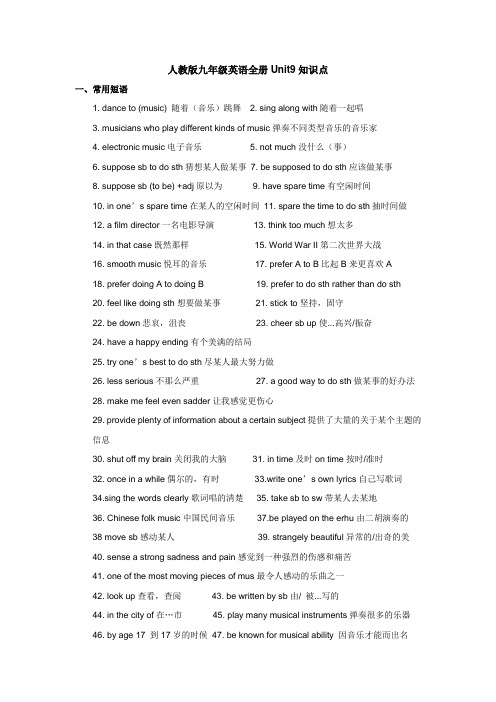
人教版九年级英语全册Unit9知识点一、常用短语1. dance to (music) 随着(音乐)跳舞2. sing along with随着一起唱3. musicians who play different kinds of music弹奏不同类型音乐的音乐家4. electronic music电子音乐5. not much没什么(事)6. suppose sb to do sth猜想某人做某事7. be supposed to do sth应该做某事8. suppose sb (to be) +adj原以为9. have spare time有空闲时间10. in one’s spare time在某人的空闲时间11. spare the time to do sth抽时间做12. a film director一名电影导演13. think too much想太多14. in that case既然那样15. World War II第二次世界大战16. smooth music悦耳的音乐17. prefer A to B比起B来更喜欢A18. prefer doing A to doing B 19. prefer to do sth rather than do sth20. feel like doing sth想要做某事21. stick to坚持,固守22. be down悲哀,沮丧23. cheer sb up使...高兴/振奋24. have a happy ending有个美满的结局25. try one’s best to do sth尽某人最大努力做26. less serious不那么严重27. a good way to do sth做某事的好办法28. make me feel even sadder让我感觉更伤心29. provide plenty of information about a certain subject提供了大量的关于某个主题的信息30. shut off my brain关闭我的大脑31. in time及时on time按时/准时32. once in a while偶尔的,有时33.write one’s own lyrics自己写歌词34.sing the words clearly歌词唱的清楚35. take sb to sw带某人去某地36. Chinese folk music中国民间音乐37.be played on the erhu由二胡演奏的38 move sb感动某人39. strangely beautiful异常的/出奇的美40. sense a strong sadness and pain感觉到一种强烈的伤感和痛苦41. one of the most moving pieces of mus最令人感动的乐曲之一42. look up查看,查阅43. be written by sb由/ 被...写的44. in the city of在…市45. play many musical instruments弹奏很多的乐器46. by age 17 到17岁的时候47. be known for musical ability 因音乐才能而出名48. develop a serious illness得了一种很重的病49. become blind成了盲人,变瞎50. for several years几年51. make money赚钱52. get married (to sb) (和某人)结婚53. continue to do sth继续做某事54.perform in this way用这种形式表演55. during/ in one’s lifetime在某人有生之年56. by the end of到...末为止57. It’s a pity that遗憾的是58. in total总共59. be recorded for the future world to hear被记录下来供后人聆听60. the great erhu masters很棒的二胡大师61. master a foreign language掌握一门外语62. praise...for因为什么赞美63. China’s national treasures中国的国家珍宝64. paint a picture of描绘了一幅画65. recall one’s deepest wounds唤起某人最深的伤痛66. painful experiences痛苦的经历67. a time for spreading joy传播快乐的时间二、重点语法1.prefer的用法【1】prefer A to B、A与B相比较,比较喜欢A例:I prefer English to Chinese. I prefer fish to meat.【2】prefer doing A to doing B,A与B相比,比较喜欢做A 例:I prefer swimming to running.【3】prefer to do A rather than do B,A与B相比,比较喜欢做A 例:I preferred to stay behind rather than go with you.【4】词组prefer not to do “不愿意做...”2. whatever相当于no matter what例:Wherever you go, whatever you do, I’ll be right here waiting for you.3. cheer up高兴起来;振作起来使欢乐;使高兴例:Cheer up!Your troubles will soon be over.He tried to cheer them up with funny stories.2.marry娶;嫁;结婚;和...结婚marry sb. / get married 表示动作例. He married a pretty girl.She married a soldier. =She got married to a soldier.They got married last year.4. keep healthy 保持健康例. In order to keep healthy, he keeps jogging every day.keep in good health, keep fit和stay healthy 都表示“保持健康”巧记以o结尾的名词变复数:注:,hero英雄,tomato西红柿,potato土豆,这些词变复数时要加是-es,其余以o结尾的加-s。
人教版九年级英语u9知识点

人教版九年级英语u9知识点U9知识点在人教版九年级英语教材中,Unit 9是一个非常重要而且有趣的单元。
它主要涉及到人物的性格特点、环保、交通工具等多个方面的知识点。
通过学习这些知识点,学生可以在英语学习中丰富自己的词汇量,提高自己的口语表达能力。
以下将围绕这几个主题展开讨论。
1. 人物的性格特点在这个单元中,我们学习了关于人物性格特点的表达方式,例如勇敢的人可以用"brave"来形容,善良的人可以用"kind"来形容,还有聪明、有趣、有耐心等等。
通过学习这些词汇,我们可以更准确地描述一个人的性格,也可以为自己的写作和口语表达提供更多的素材。
2. 环保保护环境是我们每个人的责任。
在这个单元中,我们学习了一些关于环保的知识,例如如何减少污染、节约能源、回收垃圾等等。
这些知识点对于我们每个人来说都非常重要,我们应该积极参与到环保活动中,为保护我们的地球尽一份力。
同时,这些知识点也是我们英语学习的一部分,通过学习环保知识,我们可以拓展自己的词汇量,提高自己的口语表达能力,将环保的理念传递给更多的人。
3. 交通工具交通工具是我们日常生活中必不可少的一部分。
在这个单元中,我们学习了关于交通工具的词汇,包括汽车、自行车、火车、飞机等等。
学习这些词汇可以帮助我们更好地理解和描述交通工具,也可以为我们的日常生活和旅行提供更多的表达方式。
此外,我们还学习了关于交通规则和安全的知识,这对于我们出行和保护自己的安全都非常重要。
总结起来,人教版九年级英语U9知识点既包括了人物的性格特点,又涉及到了环保和交通工具等方面的内容。
通过学习这些知识点,我们可以提高自己的词汇量,拓展自己的口语表达能力,丰富自己的英语知识。
不仅如此,这些知识点也与我们的日常生活紧密相关,对于我们的实际生活和学习都有着重要的意义。
因此,我们应该认真对待这些知识点,努力学习并将其应用于实际中,使自己的英语水平得到提高。
- 1、下载文档前请自行甄别文档内容的完整性,平台不提供额外的编辑、内容补充、找答案等附加服务。
- 2、"仅部分预览"的文档,不可在线预览部分如存在完整性等问题,可反馈申请退款(可完整预览的文档不适用该条件!)。
- 3、如文档侵犯您的权益,请联系客服反馈,我们会尽快为您处理(人工客服工作时间:9:00-18:30)。
定语从句I prefer music that has great lyrics.I love music that I can sing along with.I like music that I can dance to.. Role-play1. Hmm, depends which movie.1) 本句省略了depends前的主语it和which movie后的从句部分we’ll watch,这是典型的口语表达形式。
在口语和非正式场合,为保持语言简洁明了,交流者往往会省略彼此所知或逻辑上可明确推断的内容。
例如:Anything I can do for you?我能为您做些什么吗?(省略句首部分Is there)Please hand me one of those books; I don’t care which. 请把那些书递给我一本,不管哪本都行。
(省略句尾部分you hand me)2) It depends (on) who/ what/ how/ whether…是一个常见句型。
当depend后接疑问词及含有疑问词的短语和从句时,口语中会省略depend后的介词on,以求话语简练。
例如:It depends what day you catch me, and at what time of day.这取决于你哪天见我,以及见我的时间。
Well, as for this matter, I can’t decide for now. Depends whether or not your dad will say yes. 嗯,这件事我现在决定不了,取决于你老爸是否会同意。
2. I just want to laugh and not think too much.这句话中的to laugh和not think too much均为动词不定式,但后者在not和think之间省略了to。
英语语句中当多个不定式结构并列使用时,to出现在第一个结构中,后面的往往会省略。
再如:She likes to sing, dance and hang out with her friends.她喜欢唱歌、跳舞、与朋友们外出消遣。
3. I prefer music that has great lyrics.句中的prefer意为“更喜爱;更喜欢”,后可接名词、v.-ing形式或动词不定式。
如:I prefer the white bag. 我更喜欢那个白色的包。
Tony prefers staying / to stay at home on weekends. 托尼更喜欢周末待在家。
此外,prefer还可用于句型“prefer ... to ...”中,意为“喜欢……而不喜欢(胜过)……”。
如:Linda prefers apples to pears. 琳达喜欢苹果而不喜欢梨。
I prefer reading books to watching TV. 我喜欢阅读而不喜欢看电视。
4. I suppose I’ll just listen to this new CD I bought.仔细观察下面例句中suppose的用法和意义,然后补全结论部分所缺的内容。
a. We are supposed to get there on time.b. I suppose she will be back next year.c. —Do you suppose he will agree? —Yes, I suppose so. / No, I suppose not.a. We are supposed to get there on time.(1)观察例句a可知,“被期望/要求做某事”或“该做某事”可用__________________ 结构表示,含有必须、应该做某事之意,相当于should。
b. I suppose she will be back next year.c. —Do you suppose he will agree? —Yes, I suppose so. / No, I suppose not.(2)例句b中“suppose +that从句”意为“猜测/假定……”,that可以省略,若为否定句,和think,believe等动词的用法一样,应该否定____(主语/从句),即否定前移;例子c中对疑问句作肯定回答可用__ Yes, I suppose so __ ,否定回答可用No, I suppose not。
X. Grammar在复合句中修饰名词或代词的从句叫定语从句e.g. I like music that I can dance to. music 是先行词,that是关系代词He is the man who I met yesterday. man是先行词,who是关系代词RULES人(n.) + who/that + 从句物(n.) + that/which + 从句关系代词who; that;的作用:a. 做代词,代替先行词b. 在从句中担任句子成分:主语或宾语c. 做连词,把主句和从句连接起来who / that/which 在定语从句中做主语时,谓语动词的单复数应与先行词保持一致I prefer shoes that______ cool. (be)I like a pizza that______ really delicious. (be)I love singers who ______ beautiful. (be)I have a friend who _______ sports. (play)Reading1. While some people stick to only one kind of movies, I like to watch different kinds depending on how I feel that day.stick v. 粘贴;将……刺入(stuck, stuck)e.g. He stuck a stamp on the envelope. 他把一张邮票贴到信封上。
stick to 坚持;固守e.g. Stick to your dream, you’ll succeed with your hard work.坚持你的梦想,付出努力,你就会成功的。
2. When I’m down or tired, I prefer movies that can cheer me up.down adj. 悲哀;沮丧用于系动词后作表语e.g. When he is down, he often listens to gentle music. 他心情沮丧时,常听柔和的音乐。
cheer up 使高兴;高兴起来;使振奋e.g. Cheer up! Our troubles will soon be over. 振作起来!我们的困难很快就会过去。
3. Documentaries like March of the Penguins which provide plenty of information about a certain subject can be interesting,…plenty of 大量;充足既可修饰可数名词复数形式,也可修饰不可数名词。
e.g. There is plenty of coal in this area. 这个地区有丰富的煤。
4. I can just shut off my brain…我就让大脑不思考shut v. 关闭;关上shut off 关闭;停止运转e.g. Shut off the internet. 断开网络。
5. Once in a while, I like to watch movies that are scary. once in a while 偶尔地;间或e.g. He went to see them once in a while.他偶尔去探望他们。
Fast Reading1. …I sensed a strong sadness and pain.1) sense v. 感觉到,意识到e.g. We all seemed to sense his sadness at that time.在那个时候我们好像都感觉到了他的悲伤。
sense n. 意识,感觉e.g. People have five senses, sight, hearing, smell, taste, and touch.人有五种感觉:视觉,听觉,嗅觉,味觉和触觉。
2) sadness n. 悲哀e.g. Don't give yourself up to sadness, there's still hope! 不要太悲伤,还有希望!- ness是个名词后缀,一些形容词后加ness可变成名词,如:happy—happiness kind--kindness sad adj. 悲伤的,忧愁的e.g. She sang a sad song. 她唱着悲伤的歌。
3) pain n. 疼痛,努力e.g. He has pains in the arm. 他手臂痛。
painful adj. 痛苦的;疼痛的;令人不快的 e.g. He had a painful experience in the past. 他过去有一段痛苦的经历。
2. The piece had a simple name, Erquan Yingyue (Moon Reflected on Second Spring),…piece表示音乐作品,相当于汉语的“一首歌;一支乐曲”等。
e.g. When he was a small boy, he could hum songs and difficult pieces of music.当他还是个小孩子,就会哼唱歌曲和颇有难度的乐曲。
I especially like that short piece by Beethoven. 我特别喜欢贝多芬的那首小曲。
reflect v. 反映,映出e.g. His actions reflect his thoughts. 他的行为反映他的思想。
3. Later I looked up the history of Erquan Yingyue…look up (在字典,参考书中,通过电脑)查阅,抬头看e.g. It is unnecessary to look up every word you don’t know in the dict ionary while your are reading.阅读时,碰到生词,不必都要在词典中查阅。
